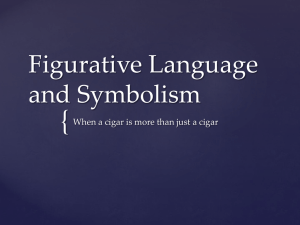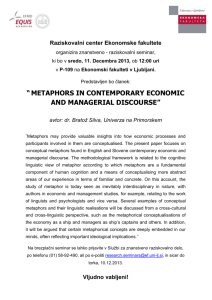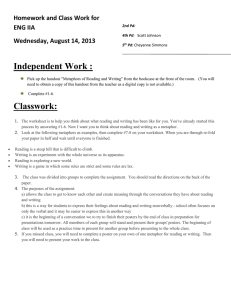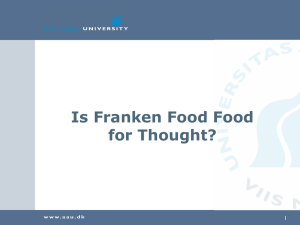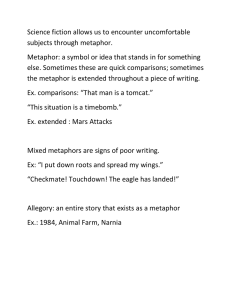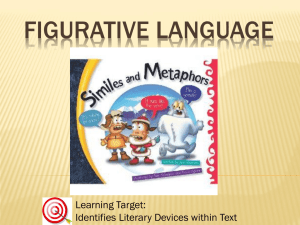{ Figurative Language: Metaphor and Simile
advertisement
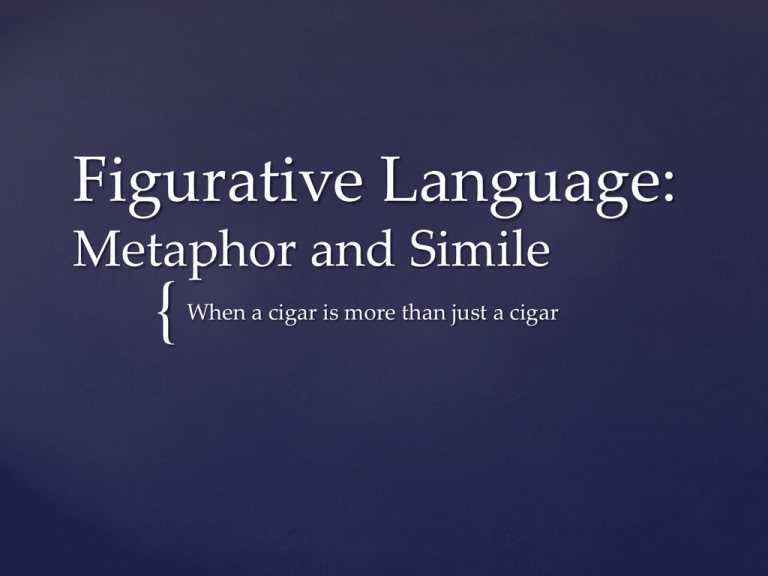
Figurative Language:
Metaphor and Simile
{
When a cigar is more than just a cigar
Literal: Words taken in their most basic sense
without symbolism, figure, or allegory. Words
do not deviate from a strictly assigned meaning
E.g. The cat sat on a mat
Figurative: Language that goes beyond the
literal usage. Language that is symbolic or
evocative, often asking us to understand more
abstract ideas by comparing them to more
literal or concrete ideas.
E.g. Metaphor, Simile, Symbolism
Literal vs. Figurative
Abstract Idea
(Love, beauty,
death)
=
Concrete object
Construction of Metaphor
Metaphor: The comparison of two unlike
things without using “like” or “as.”
Simile: The comparison of two unlike things
using “like” or “as.”
Love is like a red, red rose.
Metaphor and Simile
According to Lakoff and Johnson, “our
concepts structure what we perceive . . . and
how we relate to other people. Our conceptual
system thus plays a central role in defining our
everyday realities. If we are right to suggest
that our conceptual system is largely
metaphorical, then…what we do every day is
very much a matter of metaphor” (3).
Lakoff and Johnson,
Metaphors We Live By
Most of our concepts are abstract ideas such as
emotion, communication, and time.
We define these abstract ideas by comparing
them to concrete things such as space, motion,
and objects.
Examples:
Time is understood as money
Happiness is up, depression is down
Life is a journey
Love is a journey
Lakoff and Johnson,
Metaphors We Live By
Tenor: The (abstract) idea or concept
being described through the metaphor.
Vehicle: The (more concrete) image that
helps the reader to better understand the
more abstract idea.
E.g. Love is a red rose
Tenor and Vehicle
Read for the literal meaning, and then think
about the symbolic or metaphorical meaning
Be open to multiple symbolic meanings and
layers of meaning.
Reading Strategies
The vehicle is implied rather than stated
directly.
E.g.
Night gallops on her shadowy mare
Scattering blue wheat stalks over the fields. (13-14)
- from “Twenty Love Poems: 7” by Pablo Neruda
Implied Metaphor
All the world’s a stage,
And all the men and women merely players.
They have their exits and their entrances,
And one man in his time plays many parts,
His acts being seven ages. At first the infant,
Mewling and puking in the nurse’s arms.
Then the whining schoolboy with his satchel
And shining morning face, creeping like snail
Unwillingly to school. And then the lover,
Sighing like furnace, with a woeful ballad
Made to his mistress' eyebrow. . . .
William Shakespeare, As You Like It, 2.7
Extended Metaphor
Symbolism in Literature
Metaphors shape our understanding of the
world.
Examples: Metaphors used in war
“Metaphors can kill, as I wrote in my
original Metaphor and War paper in 1991 on the
eve of the Gulf War. Why can metaphors kill?
Because metaphors in language are reflections of
metaphorical thought that structures reasoning,
and thus our actions, both in everyday life and in
politics. In politics, they are rarely isolated. They
usually come as part of a coherent system of
concepts -- usually a moral system” (Lakoff)
Why does this matter?
Metaphorical: War is politics pursued by other
means. Politics is business
Also, the State is a Person (with enemies, friends,
neighbors)
OR War is a contest or game (with winners and
losers.)
Metaphors and outdated language disguise pain
“The Red Badge of Courage” (Stephen Crane)
The blood of young men is the “red/Sweet wine of
youth” (R. Brooke)
Real: Injury, pain, dismemberment, destruction,
death.
Metaphors and War
